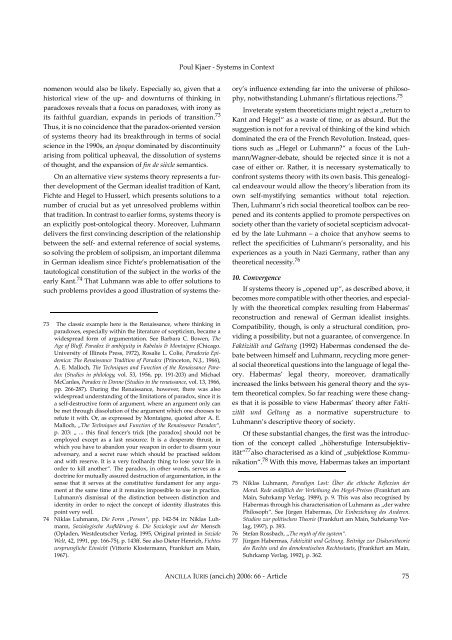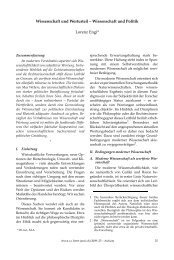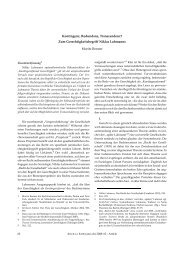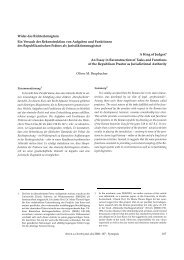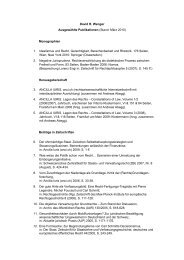On the outcome of the Habermas/Luhmann-debate
On the outcome of the Habermas/Luhmann-debate
On the outcome of the Habermas/Luhmann-debate
You also want an ePaper? Increase the reach of your titles
YUMPU automatically turns print PDFs into web optimized ePapers that Google loves.
nomenon would also be likely. Especially so, given that a<br />
historical view <strong>of</strong> <strong>the</strong> up‐ and downturns <strong>of</strong> thinking in<br />
paradoxes reveals that a focus on paradoxes, with irony as<br />
its faithful guardian, expands in periods <strong>of</strong> transition. 73<br />
Thus, it is no coincidence that <strong>the</strong> paradox‐oriented version<br />
<strong>of</strong> systems <strong>the</strong>ory had its breakthrough in terms <strong>of</strong> social<br />
science in <strong>the</strong> 1990s, an époque dominated by discontinuity<br />
arising from political upheaval, <strong>the</strong> dissolution <strong>of</strong> systems<br />
<strong>of</strong> thought, and <strong>the</strong> expansion <strong>of</strong> fin de siècle semantics.<br />
<strong>On</strong> an alternative view systems <strong>the</strong>ory represents a fur‐<br />
<strong>the</strong>r development <strong>of</strong> <strong>the</strong> German idealist tradition <strong>of</strong> Kant,<br />
Fichte and Hegel to Husserl, which presents solutions to a<br />
number <strong>of</strong> crucial but as yet unresolved problems within<br />
that tradition. In contrast to earlier forms, systems <strong>the</strong>ory is<br />
an explicitly post‐ontological <strong>the</strong>ory. Moreover, <strong>Luhmann</strong><br />
delivers <strong>the</strong> first convincing description <strong>of</strong> <strong>the</strong> relationship<br />
between <strong>the</strong> self‐ and external reference <strong>of</strong> social systems,<br />
so solving <strong>the</strong> problem <strong>of</strong> solipsism, an important dilemma<br />
in German idealism since Fichte’s problematisation <strong>of</strong> <strong>the</strong><br />
tautological constitution <strong>of</strong> <strong>the</strong> subject in <strong>the</strong> works <strong>of</strong> <strong>the</strong><br />
early Kant. 74 That <strong>Luhmann</strong> was able to <strong>of</strong>fer solutions to<br />
such problems provides a good illustration <strong>of</strong> systems <strong>the</strong>‐<br />
73 The classic example here is <strong>the</strong> Renaissance, where thinking in<br />
paradoxes, especially within <strong>the</strong> literature <strong>of</strong> scepticism, became a<br />
widespread form <strong>of</strong> argumentation. See Barbara C. Bowen, The<br />
Age <strong>of</strong> Bluff. Paradox & ambiguity in Rabelais & Montaigne (Chicago.<br />
University <strong>of</strong> Illinois Press, 1972), Rosalie L. Colie, Paradoxia Epi‐<br />
demica: The Renaissance Tradition <strong>of</strong> Paradox (Princeton, N.J., 1966),<br />
A. E. Malloch, The Techniques and Function <strong>of</strong> <strong>the</strong> Renaissance Para‐<br />
dox (Studies in philology, vol. 53, 1956, pp. 191‐203) and Michael<br />
McCanles, Paradox in Donne (Studies in <strong>the</strong> renaissance, vol. 13, 1966,<br />
pp. 266‐287). During <strong>the</strong> Renaissance, however, <strong>the</strong>re was also<br />
widespread understanding <strong>of</strong> <strong>the</strong> limitations <strong>of</strong> paradox, since it is<br />
a self‐destructive form <strong>of</strong> argument, where an argument only can<br />
be met through dissolution <strong>of</strong> <strong>the</strong> argument which one chooses to<br />
refute it with. Or, as expressed by Montaigne, quoted after A. E.<br />
Malloch, „The Techniques and Function <strong>of</strong> <strong>the</strong> Renaissance Paradox“,<br />
p. 203: „ ... this final fencer’s trick [<strong>the</strong> paradox] should not be<br />
employed except as a last resource. It is a desperate thrust, in<br />
which you have to abandon your weapon in order to disarm your<br />
adversary, and a secret ruse which should be practised seldom<br />
and with reserve. It is a very foolhardy thing to lose your life in<br />
order to kill ano<strong>the</strong>r“. The paradox, in o<strong>the</strong>r words, serves as a<br />
doctrine for mutually assured destruction <strong>of</strong> argumentation, in <strong>the</strong><br />
sense that it serves at <strong>the</strong> constitutive fundament for any argu‐<br />
ment at <strong>the</strong> same time at it remains impossible to use in practice.<br />
<strong>Luhmann</strong>’s dismissal <strong>of</strong> <strong>the</strong> distinction between distinction and<br />
identity in order to reject <strong>the</strong> concept <strong>of</strong> identity illustrates this<br />
point very well.<br />
74 Niklas <strong>Luhmann</strong>, Die Form „Person“, pp. 142‐54 in: Niklas Luh‐<br />
mann, Soziologische Aufklärung 6. Die Soziologie und der Mensch<br />
(Opladen, Westdeutscher Verlag, 1995, Original printed in Soziale<br />
Welt, 42, 1991, pp. 166‐75), p. 143ff. See also Dieter Henrich, Fichtes<br />
ursprungliche Einsicht (Vittorio Klostermann, Frankfurt am Main,<br />
1967).<br />
Poul Kjaer ‐ Systems in Context<br />
ory’s influence extending far into <strong>the</strong> universe <strong>of</strong> philoso‐<br />
phy, notwithstanding <strong>Luhmann</strong>’s flirtatious rejections. 75<br />
Inveterate system <strong>the</strong>oreticians might reject a „return to<br />
Kant and Hegel“ as a waste <strong>of</strong> time, or as absurd. But <strong>the</strong><br />
suggestion is not for a revival <strong>of</strong> thinking <strong>of</strong> <strong>the</strong> kind which<br />
dominated <strong>the</strong> era <strong>of</strong> <strong>the</strong> French Revolution. Instead, ques‐<br />
tions such as „Hegel or <strong>Luhmann</strong>?“ a focus <strong>of</strong> <strong>the</strong> Luh‐<br />
mann/Wagner‐<strong>debate</strong>, should be rejected since it is not a<br />
case <strong>of</strong> ei<strong>the</strong>r or. Ra<strong>the</strong>r, it is necessary systematically to<br />
confront systems <strong>the</strong>ory with its own basis. This genealogi‐<br />
cal endeavour would allow <strong>the</strong> <strong>the</strong>ory’s liberation from its<br />
own self‐mystifying semantics without total rejection.<br />
Then, <strong>Luhmann</strong>’s rich social <strong>the</strong>oretical toolbox can be reo‐<br />
pened and its contents applied to promote perspectives on<br />
society o<strong>the</strong>r than <strong>the</strong> variety <strong>of</strong> societal scepticism advocat‐<br />
ed by <strong>the</strong> late <strong>Luhmann</strong> – a choice that anyhow seems to<br />
reflect <strong>the</strong> specificities <strong>of</strong> <strong>Luhmann</strong>’s personality, and his<br />
experiences as a youth in Nazi Germany, ra<strong>the</strong>r than any<br />
<strong>the</strong>oretical necessity. 76<br />
10. Convergence<br />
If systems <strong>the</strong>ory is „opened up“, as described above, it<br />
becomes more compatible with o<strong>the</strong>r <strong>the</strong>ories, and especial‐<br />
ly with <strong>the</strong> <strong>the</strong>oretical complex resulting from <strong>Habermas</strong>’<br />
reconstruction and renewal <strong>of</strong> German idealist insights.<br />
Compatibility, though, is only a structural condition, pro‐<br />
viding a possibility, but not a guarantee, <strong>of</strong> convergence. In<br />
Faktizität und Geltung (1992) <strong>Habermas</strong> condensed <strong>the</strong> de‐<br />
bate between himself and <strong>Luhmann</strong>, recycling more gener‐<br />
al social <strong>the</strong>oretical questions into <strong>the</strong> language <strong>of</strong> legal <strong>the</strong>‐<br />
ory. <strong>Habermas</strong>’ legal <strong>the</strong>ory, moreover, dramatically<br />
increased <strong>the</strong> links between his general <strong>the</strong>ory and <strong>the</strong> sys‐<br />
tem <strong>the</strong>oretical complex. So far reaching were <strong>the</strong>se chang‐<br />
es that it is possible to view <strong>Habermas</strong>’ <strong>the</strong>ory after Fakti‐<br />
zität und Geltung as a normative superstructure to<br />
<strong>Luhmann</strong>’s descriptive <strong>the</strong>ory <strong>of</strong> society.<br />
Of <strong>the</strong>se substantial changes, <strong>the</strong> first was <strong>the</strong> introduc‐<br />
tion <strong>of</strong> <strong>the</strong> concept called „höherstufige Intersubjektiv‐<br />
ität“ 77 also characterised as a kind <strong>of</strong> „subjektlose Kommu‐<br />
nikation“. 78 With this move, <strong>Habermas</strong> takes an important<br />
75 Niklas <strong>Luhmann</strong>, Paradigm Lost: Über die ethische Reflexion der<br />
Moral. Rede anläßlich der Verleihung des Hegel‐Preises (Frankfurt am<br />
Main, Suhrkamp Verlag, 1989), p. 9. This was also recognised by<br />
<strong>Habermas</strong> through his characterisation <strong>of</strong> <strong>Luhmann</strong> as „der wahre<br />
Philosoph“. See Jürgen <strong>Habermas</strong>, Die Einbeziehung des Anderen.<br />
Studien zur politischen Theorie (Frankfurt am Main, Suhrkamp Ver‐<br />
lag, 1997), p. 393.<br />
76 Stefan Rossbach, „The myth <strong>of</strong> <strong>the</strong> system“.<br />
77 Jürgen <strong>Habermas</strong>, Faktizität und Geltung. Beiträge zur Diskurs<strong>the</strong>orie<br />
des Rechts und des demokratischen Rechtsstaats, (Frankfurt am Main,<br />
Suhrkamp Verlag, 1992), p. 362.<br />
ANCILLA IURIS (anci.ch) 2006: 66 ‐ Article 75


